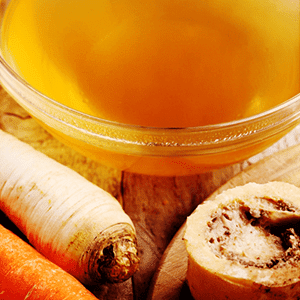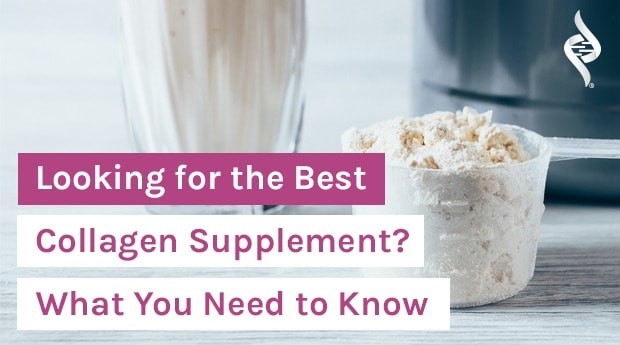Looking for the Best Collagen Supplement? What You Need to Know
In a hurry? Click here to read the Article Summary...
There are dozens of ways to purchase and use collagen these days, including collagen powder, drinks, creams, topicals, and even collagen-infused candies and beer! Of course (as with everything), quality is of the utmost importance when choosing the best collagen supplement for your needs. Here’s a little primer to help you get going if you’re new to collagen and considering adding collagen supplementation to your daily health and beauty routine.
Understanding the Different Types of Collagen

Before we go into all the different forms that collagen supplements can come in (and there are more on the market every day), let’s take a look at the various types of collagen that the human body produces naturally.
This is important to know since different collagen products may contain different types of collagen. You will want to choose a collagen supplement that contains the types that address your health needs.
All collagens have basically the same job: to create and support the structural integrity of the human body in one way or another. Even though this sounds simple, it’s actually a pretty awesome task.
Think about it… just about every area of the body needs this kind of support in the form of connective tissue, muscles, bones, skin, and much more. These little bundles of amino acids are vitally important for the functioning of your entire body, not just the aspects that you can see like your skin elasticity.
There Are Over a Dozen Types of Collagen
Scientists have discovered over a dozen different collagen types in the human body. Types I, II, and III are the most common and account for 80% to 90% of the collagen in the human body. Types I and III are found everywhere – the stomach, reproductive organs, skin, hair, and nails as well as the “reticular fibers” of connective tissue.
As a stand-alone, Type III collagen is vitally important. A study published as part of the Proceedings of the National Academy of Sciences found that low Type III collagen levels can lead to ruptured blood vessels and could even be life-threatening [1].

Type II is vital as well, but for a different reason. Most of the Type II collagen in the body comes in the form of cartilage between joints and bones [2]. This is why Type II is sometimes called “Cartilage Collagen.”
Other types of collagen that are typical include Type IV, which promotes cellular health, and Type V, which assists in forming cell surfaces, hair, and the placenta of a baby.
How to Pick the Best Collagen Supplement
Now that you’re armed with a little more knowledge about the different types of collagen that the body produces naturally, we’re ready to dive into the ever-changing world of collagen supplements.
Make no mistake about it, collagen is currently the “it” product when it comes to the latest trends in health and beauty. On the one hand, this is a good thing. All the PR this substance is getting is helping to educate individuals about the amazing regenerating capacities of the body.

The sudden inundation of dozens of products over the last few years, however, can also make choosing the best collagen supplement for you downright confusing.
Here are some facts about the different kinds of collagen supplements out there to help set the record straight when it comes to collagen in the marketplace:
Tip: Look for Collagen Peptides
Most digestible collagen supplements worth their weight come in the form of “collagen peptides.” A peptide is a small cluster of amino acids which are linked together in a chain formation. Collagen peptides form together to create collagen fibrils, or elongated fibers. It’s these fibrils that eventually come together to create tissue in the body that you can see with the naked eye.
Supplements that contain collagen peptides use a special process called “enzymatic hydrolysis” [3] to break down fibrils into smaller parts. This helps your body to absorb its nutrients in a faster, more efficient manner.
Other names for collagen peptide include “hydrolyzed collagen” and “collagen hydrolysate.”
Marine Collagen
Marine collagen is derived from fish, as the name implies. It contains mostly Type I and III collagen and is a favorite go-to for those wanting stronger nails and to reduce fine lines and wrinkles.

The advantage of this kind of collagen is that it is reportedly even easier to absorb in the body than peptides derived from other animals.
In addition, marine collagen contains a special amino acid cluster called collagecin, which is anti-microbial. A report published in the journal Biochemical and Biophysical Research Communications [4] found that collagen derived from fish was able to inhibit the growth of the harmful bacteria Staphylococcus.
The down-side of consuming marine collagen can be toxicity. Many marine collagen products are produced from fish waste products that would normally be thrown away. These include the bones, skin, innards, eyes, and other non-edible parts.
Unfortunately, toxicity in fish farming operations and even in some wild-caught varieties is on the rise. A report [5] published in a 2014 edition of the journal Aquaculture addressed the growing problem of sea lice in farm-raised salmon production and the pesticides used to try to control it.
Insecticides such as AlphaMax®, Salmosan®, Interox®, and Paramove™ were lethal to lobsters living as far as 10 kilometers away. Although no studies have proven significant toxicity in fish collagen thus far, it’s still prudent to make sure that your marine collagen product comes from wild-caught fish and has also been tested for contaminants.
Chicken Collagen

Chicken collagen may have some additional health benefits, especially for arthritis. All types of collagen can help support pain-free joints [6]. Chicken collagen in particular, however, is heavily loaded with chondroitin sulfate and glucosamine sulfate. Both of these micronutrients have been shown in countless studies to help with both rheumatoid and osteoarthritis.
A German meta-analysis published in the International Journal of Rheumatology in 2011 [7] found that, across the board, chondroitin sulfate and glucosamine sulfate affected arthritic conditions by stimulating cartilage metabolism as well as delaying inflammatory responses. These substances also help maintain healthy pH levels, which has an effect on inflammation as well.
Undenatured type II collagen from chicken has also been shown to help the immune system and assist with rebalancing autoimmune responses [8].
Plant-Based “Collagen”
What if you’re vegan but still want to up your collagen levels? In this case, there are so-called “plant-based collagen” products. In reality, plants do not contain collagen – only animals do. But there are dozens of phytonutrients (plant chemicals) that can help your own body produce more collagen naturally as well as increase cellular receptor sites for collagen [9].

Plants that help to boost natural collagen production in the body are any fruit, vegetable, or herb with high vitamin C levels such as:
In addition, herbs and foods that are high in silica, calcium, and phosphorus will promote collagen production. In fact, such plants been used for thousands of years for “bone knitting” and to promote wound healing.
Collagen-Infused Drinks and Chews
Yes, they’re out there. Everything from collagen beer [10] to collagen-infused gummy bears. Most of these products are billed as being able to enhance beauty by supporting skin health and hydration. Many also contain other skin-supporting substances such as vitamin C and hyaluronic acid.
Thus far, there have been no formal studies which directly support whether chewables and novelty collagen products are effective or not. Although there was one study that did conclude that one commercial brand of collagen drinkable led to noticeable improvements in skin after three months of daily use [11].
Again, use caution when considering these products and be aware of the other ingredients that may be in them, such as sugar, high fructose corn syrup, food dyes, and preservatives that may do more harm than good for your overall health.
Collagen Creams

Many collagen creams for skin care and renewal are also called “anti-aging” creams. Most are based on the science behind pentapeptides and hexapeptides (remember that peptides are the building blocks of collagen).
Pentapeptides are small clusters of five long-chain amino acids that act like chemical messengers in the body. Likewise, hexapeptides are chains of six amino acids. They have been known to relax and smooth up certain facial wrinkles.
Hexapeptides and pentapeptides have long been used in medicine for wound healing because of how they can repair the skin and also because of their anti-microbial properties [12]. The same principle applies to beauty products that have these collagen-precursors in them.
Again, the main thing to watch out for in collagen beauty creams is the purity of the product. Many popular commercial brands [13] contain endocrine disruptors and other chemical toxins. Keep in mind that we literally “eat” through our skin (meaning what we apply on our skin ends up in our bloodstream). Any collagen product that isn’t 100% natural should be avoided.
What About Bone Broth?
And finally, there’s bone broth. This is actually a whole food but also falls into the supplement category. This is because companies (including Organixx) offer powdered versions of the broth for busy people who still want all the nutrients found in bone broth – without all the time and effort of having to make it.

The benefits of bone broth are too numerous to mention here. Suffice to say that, hands down, drinking organic bone broth is one great way to not only get your collagen in but also dozens of other minerals and nutrients that can help your gut, joints, skin, and your whole body.
The collagen in bone broth comes in the form of gelatin, which is what these peptide clusters turn in to when they are cooked. (For more help understanding the differences between bone broth and collagen, click here.)
The Best Collagen Supplement is the Highest Quality One You Can Find!
As you’ve learned throughout this article, the common denominator to watch out for in all collagen supplements products is quality. Whichever way you decide to go, make sure that the collagen product that you pick is derived from clean animal sources (e.g., pasture-raised grass-fed bovine) and does not contain harmful toxins.
It’s important to do your homework because not all collagen products are created equally. A 2017 study conducted by the non-profit Consumer Wellness Center on collagen supplements derived from non-organic CAFOs (concentrated animal feeding operations) found that these products contained dozens of harmful substances such as antibiotics, parabens, steroids, and insecticides [14].
This same caution also applies to any protein powders or bone broth products you may purchase. Other considerations that may be important to you personally include products that are gluten free, dairy free, and/or paleo-friendly.
So, there you have it. The basics you need to get your journey with collagen supplements started and on the right track. Just remember, whether you decide that the best collagen supplement for you is a cream, a chewable, or a powder – keep it clean and high quality to truly reap the benefits of this vital substance for your body.
Organixx Clean Sourced Collagens blend contains five types of collagen from four sources. What’s more, it’s combined with targeted nutrients such as zinc, vitamin C, and vitamin B6 which specifically enhance the bioavailability and potency of collagen. Clean Sourced Collagens is formulated from the ground up to enhance and support your body’s natural ability to heal and rebuild itself from the INSIDE out.

 Sources:
Sources:
Article Summary
There are dozens of ways to purchase and use collagen these days. If you’re new to collagen, remember that quality should be one of the key factors you look for.
Scientists have discovered over a dozen different collagen types in the human body. Types I, II, and III are the most common.
The best digestible collagen supplements come in the form of “collagen peptides.” A peptide is a small cluster of amino acids which are linked together in a chain formation.
Other names for collagen peptide include “hydrolyzed collagen” and “collagen hydrolysate.”
Collagen can come from different animal products including fish, chicken, beef, eggshells, etc. There is no plant-based source of collagen. However, different plants can help your body produce more collagen naturally.
Bone broth is both a food and a supplement that contains collagen.
Whatever type of collagen supplement you decide to use, make sure it’s a brand that’s derived from clean animal sources and does not contain harmful toxins, such as Organixx Clean Sourced Collagens.





How many servings per bag?
Hi Vickie, thanks for your interest.
We actually carry 15, 20, and 30 serving bags of our Clean Sourced Collagens. Feel free to check it out here: https://shop.organixx.com/.
We hope this helps and you decide to give it a try. Cheers to your good health!
At least 3 people have inquired about the effectiveness of mixing type 2 collagen with other types and you have yet to answer the question. Please answer it without repeating the same info and referring to a lengthy article. I am deciding between 2 companies and this question is important.
It’s interesting that the question as to whether or not taking all the different collagens together in your product interferes with the absorption of some is still being skirted. That in itself makes me wonder if they might be best if taken separately. I have used 3 bags of your collagen and have not noticed any real difference but I like the product. I wasn’t aware that they might be best taken separately. I think your customers need the question answered. Really? A yes or no will do.
Patricia
I was also wondering why after 2 different people asked if using the type 2 collagen had any negative consequences
or otherwise should not be used along with type 1, 3, or 1+3 , you did not DEFINITIVELY answer, simply, YES OR NO! I guess we all know by now what seems to be the answer : although all of the different types are beneficial, DON’T use type 2 with types 1 & 3 together! (?)
I was not happy with our previous collagen so I am awaiting yours. You still did not answer the original question above about the possible interaction in a negative way of 1,2,3 being consumed together. The answer would be either yes or no to whether one might cancel out the other in your mfrd product. That is concerning. Your answers were repetitive. Answer the question. I ordered six bags.